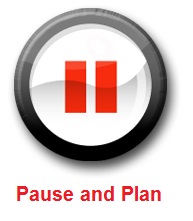Responding to Misbehavior: Fight or Flight Versus Pause and Plan
by Kathy Slattengren, M. Ed., Priceless Parenting (sign up for monthly parenting newsletter and receive 20+ printable charts for kids and parents)


How do you feel when your kids misbehave? When I ask parents this question during classes,
the most common responses are feelings of anger, frustration and discouragement.
If you're like most parents, when your kids misbehave you experience powerful, negative feelings. If you choose to act in the moment, you are likely to come up with your worst parenting responses. You may find yourself:
- Yelling at your kids - "I'm never taking you here again!" (even though you probably will be going back to the grocery store at some point)
- Threatening them - "I'll just leave you here!" (even though it is actually against the law to abandon your kids at McDonalds)
- Saying things you soon regret and they don't forget - "You are a disgrace to our family!" (even though you really don't mean it)
- Hitting them (even though you swore you'd never do that)
Ouch! Why are these types of responses so easy to fall into?
Responding with Fight or Flight
When you get upset with your kids, your body is triggered into a
fight or flight response. The fight or flight response is a natural physical reaction to a perceived threat or harmful event. Chemicals flood your body in preparation for fighting or fleeing. Your heart beats faster, your blood pressure goes up, your breathing quickens plus many other things which your body does automatically.
At this point you are ready to fight or run away but you are in a poor position to make a wise response to your children's behavior. In her book,
The Willpower Instinct: How Self-Control Works, Why It Matters, and What You Can Do To Get More of It, psychologist Kelly McGonigal explains "The fight-or-flight response floods the body with energy to act instinctively, and steals it from the areas of the brain needed for wise decision making."
No wonder it's hard to think straight! Your ability to think clearly is temporarily hijacked when these chemicals get released. Your body is responding perfectly if you are about to be mugged or attacked by a dog but not so great if you are dealing with your children's misbehavior.
Responding with Pause and Plan
How can you overcome this natural fight or flight response and re-engage the thinking parts of your brain? The secret is to engage the pause-and-plan response.
McGonigal describes the way it works. "Your brain needs to bring the body on board with your goals and put the brakes on your impulses. To do this, your prefrontal cortex will communicate the need for self-control to lower brain regions that regulate your heart rate, blood pressure, breathing, and other automatic functions. The pause-and-plan response drives you in the opposite direction of the fight-or-flight response. Instead of speeding up, your heart slows down, and your blood pressure stays normal. Instead of hyperventilating like a madman, you take a deep breath. Instead of tensing muscles to prime them for action, your body relaxes a little."
One of the easiest ways to do this is to focus on your breathing. If you can intentionally slow your breathing down to about 6 breaths per minute, you will cause your body to relax.
Once you pause and calm down, you will be in a much better position to respond in a helpful, not hurtful, way to your children. McGonigal goes on to say "The pause-and-plan response sends that energy to the brain - and not just anywhere in the brain, but specifically to the self-control center, the prefrontal cortex. Stress encourages you to focus on immediate, short-term goals and outcomes, but self-control requires keeping the big picture in mind. Learning how to better manage your stress is one of the most important things you can do to improve your willpower."
Decreasing Stress to Increase Self-Control
The more stress you feel, the more difficult it is to exercise self-control. Have you ever felt less self-control when you are feeling
- Hungry
- Tired
- Worried
- Physical pain
- Sick
- Angry, sad or frustrated?
I certainly have! If you needed any more justification for taking care of your needs, you now have it. In order to be your best for your kids, you need to take good care of yourself.
All of this is easier said than done. However it is within your power to make new decisions in your life that will support better self-care. With determination you can make pause-and-plan your typical response to your children's behavior instead of fight-or-flight.